You are using an out of date browser. It may not display this or other websites correctly.
You should upgrade or use an alternative browser.
You should upgrade or use an alternative browser.
"What Madness Is This?" Volume I: The Union Forever
- Thread starter Napoleon53
- Start date
Threadmarks
View all 142 threadmarks
Reader mode
Reader mode
Recent threadmarks
THE 2019 MADNESSVERSE HOLIDAY SPECIAL: "IT'S PATRIOT-SAINTS DAY, ZAP ZEPHYR!" THE BIGGEST HOSTAGE OF ALL "THE WHOLE WORLD HEARS YOU!" OSWALD: AUTHOR OF HIS OWN DESTINY THE GREAT EUROPEAN SCHISM: RISE OF THE NEW HOLY ROMAN EMPIRE IN A "SAFE" PLACE THE SUMMER OF '37: THE OLD HOMESTEAD ROUNDERS: THE WORLD SPORTI was pleased to see the implementation of both the Norfolk and my AFC slaves idea, and you put them together in a way I didn't even think of! 'Hope' we see similar success for the AFC in Haiti.
Sad to see what's come of the South in general: the Old Dominion under a militarist junta after massacring desperate slaves, CoCaro losing over a third of its land and no doubt going down a revanchist route. I do hope that Georgia at least stays relatively positive, and that by the time war with the RU rolls around Columbia has stabilized and liberalized.
Sad to see what's come of the South in general: the Old Dominion under a militarist junta after massacring desperate slaves, CoCaro losing over a third of its land and no doubt going down a revanchist route. I do hope that Georgia at least stays relatively positive, and that by the time war with the RU rolls around Columbia has stabilized and liberalized.
I do hope that Georgia at least stays relatively positive, and that by the time war with the RU rolls around Columbia has stabilized and liberalized.
I too hope that Columbia liberalizes, even if it goes against my desire to see West Carolina reclaimed (what can I say, the revanchism got to me, lol).
That being said, I don't think Georgia is "positive." Their President Bulloch was something of a far-right imperialist if I'm not mistaken.
I'm going to guess that the RU gets knocked down a peg or two before the 20th century. Otherwise, how else would fascism gain any traction?Sad to see what's come of the South in general: the Old Dominion under a militarist junta after massacring desperate slaves, CoCaro losing over a third of its land and no doubt going down a revanchist route. I do hope that Georgia at least stays relatively positive, and that by the time war with the RU rolls around Columbia has stabilized and liberalized.
The seeds were sown by 1812. Beyond that, it's just a slow build.I'm going to guess that the RU gets knocked down a peg or two before the 20th century. Otherwise, how else would fascism gain any traction?
The seeds were sown by 1812. Beyond that, it's just a slow build.
This. Plus I think Napo has mentioned the possibility of a inconclusive war in the 1850's/60's against the South
Given the fact John Brown and likely Nat Turner are Patriot-Saints, I can see the future Liberia and it capital being named after both Brown and Turner.
Also, Zachary Taylor reminds me of a evil Cincinnatus.
And yet another reason why the Union is and would be still pretty humanized at this point of time along with Georgia.
Also, Zachary Taylor reminds me of a evil Cincinnatus.
I could see the southern slave states doing some ethnic cleansing on it's slaves in the future while having a southern version of the afc.
And yet another reason why the Union is and would be still pretty humanized at this point of time along with Georgia.
I was pleased to see the implementation of both the Norfolk and my AFC slaves idea, and you put them together in a way I didn't even think of! 'Hope' we see similar success for the AFC in Haiti.
Sad to see what's come of the South in general: the Old Dominion under a militarist junta after massacring desperate slaves, CoCaro losing over a third of its land and no doubt going down a revanchist route. I do hope that Georgia at least stays relatively positive, and that by the time war with the RU rolls around Columbia has stabilized and liberalized.
Georgia is helping Texas and dealing with Iturbide. (Who who refuse to lose any land, and is attacking Texas AND Louisiana.) Althought with the way CoCaro been lay low, it would help Georgia bring up more soldiers to help Texas.
What I'm wondering is how Britain is doing. I mean, being defeated by their sworn enemy doesn't result in good faith. Could there be any radicalism?
Well....the 1830s are coming....could be the perfect seeds for the Chartists to take power...
Chartism? Could be interesting. We might see the end of the Monarchy, consider its recent stained history. Could there be a Second Commonwealth of England?
Could be...I guess we'll have to wait and see what Napoleon53 has in mind...
On England...
Second Commonwealth of England?
CROMWELL ENGAGE.
But really, that seems likely given how awful everything been between losing the 13 Colonies, to the mad Kings, and France and the RU costing it EVERYTHING ELSE.
You could have another Commonwealth, you have the Pre-Raphaelite Brotherhood, you have a Gothic Revival, you have Charles Darwin and the theory of evolution, you have wild Industrialists that could rule. The list goes on what you can use for the future of England.
Last edited:
AeroTheZealousOne
Monthly Donor
Not a single update popped up for me, I had to manually dig in. Boy, was I in for the treat!
Holy crap! That's actually pretty crazy when you think about it. This too shall pass...
Where have I heard this before? It sounds so familiar. That, and the idea of the RU adopting Marxism with the context revoked has me in stitches... Until the context is added and it's a nightmare. And, of course, "Cultural Marxism" has a completely different meaning than the garbage definition from OTL...
Honestly, aside from worker abuse that is pretty much just a ratcheting up of OTL abuses and more EV0L rhetoric, the Union of this TL has actually committed LESS ATROCITIES THAN OTL USA so far. Just let that sink in real quick. Even I myself just realized it. Without the Trail of Tears, as much westward expansion, and with the abolition of slavery in 1820, the Union actually hasn't done any atrocities so far other than discriminate heavily and have company goons beat workers. That doesn't make them good or even okay guys at all but boy that messed with me when I worked that out in my head. England, Canada, France, Virginia, Carolinas, and Mexico have all been described as committing what would constitute a modern war crime ITTL. Only the Union and Georgia have been spared so far. I feel like this shows how much more humanized the Union is this go-round.
Holy crap! That's actually pretty crazy when you think about it. This too shall pass...
Henry Marx, an amateur scientist and Jewish immigrant from Bavaria, came to the Union escaping anti-Jewish pogroms, attended Princeton University, and became the founder of Marxism, a scientific doctrine that would wind up fueling human rights abuses, atrocities, genocide and massacres for centuries.
Where have I heard this before? It sounds so familiar. That, and the idea of the RU adopting Marxism with the context revoked has me in stitches... Until the context is added and it's a nightmare. And, of course, "Cultural Marxism" has a completely different meaning than the garbage definition from OTL...
An interesting clip summarizing phrenology of OTL for anyone unfamiliar. Phrenology always stuck with me as I remember a doctor's office when I was a kid have a skull cut-out that was Victorian style and my dad explained how people used to basically use it for racism. lol
I will also say this: I can see a movement longing for the past glory of England. King Arthur, Alfred the Great, Æthelstan, Lionheart, Henry V, Henry the 8th, Queen Elizabeth, Henry VII, James Wolfe, Sir Francis Drake, all them and more would be uplifted as all get out. (To the point of 'one day they shall come back and lead us to glory' kind of deal.)
Same for the RU in that, a movement talks about 'In our Darkest Hour, George Washington/Benedict Arnold/ Aaron Burr will arise from Heaven/ Elysium and save us'. It being a part of the AFC, or its own thing is up to you.
Same for the RU in that, a movement talks about 'In our Darkest Hour, George Washington/Benedict Arnold/ Aaron Burr will arise from Heaven/ Elysium and save us'. It being a part of the AFC, or its own thing is up to you.
I will also say this: I can see a movement longing for the past glory of England. King Arthur, Alfred the Great, Æthelstan, Lionheart, Henry V, Henry the 8th, Queen Elizabeth, Henry VII, James Wolfe, Sir Francis Drake, all them and more would be uplifted as all get out. (To the point of 'one day they shall come back and lead us to glory' kind of deal.)
Same for the RU in that, a movement talks about 'In our Darkest Hour, George Washington/Benedict Arnold/ Aaron Burr will arise from Heaven/ Elysium and save us'. It being a part of the AFC, or its own thing is up to you.
Would the Republican Union really venerate a damn dirty Southron man like Washington though?
hey @Napoleon53 what happened to washington family?Would the Republican Union really venerate a damn dirty Southron man like Washington though?
Would the Republican Union really venerate a damn dirty Southron man like Washington though?
I would think he be seen as the Founder of 'Old America'. A 'forerunner' to the RU. (And NUSA.) He died fighting the Freach, a martyr to America and the way of Freedom.
It be Adams and Hamilton that get all the crap. (Which they did cause the old USA to fall apart between corruption and the war with France and Spain.)
Would the Republican Union really venerate a damn dirty Southron man like Washington though?
Yes, he is seen as the Father of the Old Republic and I wrote his bones are considered sacred relics of the AFC.
I will also say this: I can see a movement longing for the past glory of England. King Arthur, Alfred the Great, Æthelstan, Lionheart, Henry V, Henry the 8th, Queen Elizabeth, Henry VII, James Wolfe, Sir Francis Drake, all them and more would be uplifted as all get out. (To the point of 'one day they shall come back and lead us to glory' kind of deal.)
Same for the RU in that, a movement talks about 'In our Darkest Hour, George Washington/Benedict Arnold/ Aaron Burr will arise from Heaven/ Elysium and save us'. It being a part of the AFC, or its own thing is up to you.
I sort of plan on this, honestly. lol I was just reading about English folk heroes yesterday lol
CHAPTER 19
CHAPTER 19
THE WORLD CONGRESS OF BERLIN

Emperor Napoleon I of Spain (Napoleon II of France), King of Rome, Duke of Reichstadt, Prince of Bombay, House of Bonaparte
THE WORLD CONGRESS OF BERLIN
Emperor Napoleon I of Spain (Napoleon II of France), King of Rome, Duke of Reichstadt, Prince of Bombay, House of Bonaparte
Napoleon II turned 16 in 1827, and he received a most splendorous birthday gift from his father: Spain. All of it. Ferdinand was dead, the Bourbons were fleeing the continent, the Inquisition was locked up in the Imperial dungeons, and the Spanish army was so malnourished and abandoned that many of the Bourbon troops were pledging loyalty to Napoleon II (newly arrived in Iberia from his visits to India that same year). It was finally over for feudalism forever in the West; the European Alliance and the Napoleonic Code had ended the ancient Spanish way of life. Only Russia remained as a reminder of the Middle Ages and its fiefdoms. The pre-1809 borders of Portugal were restored, Spanish colonies everywhere were confiscated for good, and the House of Bourbon was summarily outlawed from ever holding office or rank in Spain or France.
The consequences of this moment were great in number and power. With father and son on the throne of France and Spain, as well as their assorted principalities and titles, and their stepfather/grandfather on the Austrian throne, and their cousins, stepsons, daughters, stepdaughters, and extended family on the thrones of Italy and Ireland, Southern Europe became the playground of the Bonaparte family. Any questions over Austria's alliance with France were quieted when news leaked that the ailing Kaiser Franz, wracked with early-onset dementia, was supposedly considering skipping over his mentally incompetent and unstable son Ferdinand, Prince of Bengal, in favor of his grandson "L'Aiglon" (which, to differentiate Napoleon II from the the I, was Franz's nickname for the new Spanish monarch). French Empress Marie Louise was supposedly the real power behind her increasingly senile Kaiser-father, and was making a place for her son to be the greatest monarch and leader the world had ever seen, at the expense of her brother. Upon Napoleon I's death, Napoleon II would be Caesar of the French, Emperor of the Spanish, Kaiser of the Austrians, Emperor of India, King of Italy, Duke of Reichstadt, and the master of all the colonies and territories under the power thereof, while dear old water-on-the-brain gibbering Prince Ferdinand would get a far off disease-ridden spice colony, just to add insult to injury.

Kaiser Franz I, Age 60 (1828)
Europe was rocked. Prussia flew into a panic. If Austria permanently fell under the Bonapartes, all bets were off. Russia's Czar Nicholas had formed a good friendship with Napoleon II, and treated him like a nephew. Above Prussia was Napoleon's godson, Oscar, sitting on the Swedish throne. Denmark-Norway, very close to Prussia, was also concerned that this future "Tripartite Superstate" would be unstoppable to weaker powers such as itself.

Friedrich Wilhelm III
Friedrich Wilhelm III of Prussia wasn't a hateful or vengeful man. Caesar had treated him well to his face, but the stalwart Prussian just wanted to keep the balance of the Pax Napoleonica in place. Berlin was set to host the next World Congress. All the leaders would be together again. There, the Prussian monarch would offer a deal to Czar Nicholas. The Balance of Europe would be partially returned if Prussia and Russia drew closer together, possibly forming a friendship with the Turks or Danes. If they could do that, there would be a Eurasia divided in two, one side Franco-Spanish-Austrian, the other Prusso-Russo-Turkish. One side Catholic, the other Protestant, Orthodox, and Muslim. Friedrich did not desire war--he prayed against it--but he didn't want to be without oil for his lamp if the master came home to roost. Therefore, he drew up his plans in secret, waiting and hoping the day would never come when he would have to use them.
One set of plans he did very much want to put to good use was his plans for the 1832 World Congress of Berlin, which he had been working on since before the Congress of Vienna had even been ended. Berlin had been in a state of construction since the end of the Great Wars of the Empire, with all gears moving toward making Berlin an industrial and economic powerhouse. "Berlin is not going to be upstaged by any foreign city," Friedrich Wilhelm was known to have said with distaste. Factories shot up everywhere, forming giant black pillars of industry, looming over the city like the castle turrets of the Hohenzollerns. All the roads were paved, specialized cleaning crews trimmed hedges and trees and raked parks, cleaned the streets, and repainted all the public buildings. Huge hotels were erected for the future arrival of the world leaders, staffed by thousands of butlers and servants and cooks. Specialty regiments were formed to guard the buildings and give an air of Prussian ironfistedness and security.
It was with nothing short of absolute joy that the Prussian king received news that one of his least favorite people had died six months before the start of the Congress. The gluttonous and ancient Frederick Augustus of Saxony, Warsaw, and Finland had passed away of massive heart failure in Dresden. Now, his daughter, Maria Augusta, would be Queen of Saxony, Grand Duchess of Warsaw and Grand Princess of Finland. She was 50 years old, unmarried, and without heir, supposedly because she was considered "monstrously ugly." Things were looking grim for the House of Wettin, and the imminent extinction of Saxony's ruling family would likely be brought up at the Congress.
The Prussian ruler had a plan. He would marry Maria. He had been unmarried since the passing of his beloved wife Luise in 1810. Now, he would make sure his son Friedrich Wilhelm IV would be the master of a new Prussian Empire, encompassing Prussia, Saxony, Warsaw, Finland, and their respective colonies. His advisors told him to possibly consider not naming such a prospective nation the "Prussian Empire," for fear of offending Caesar, the Kaiser, or the Tsar. He grew enraged at this, declaring "Prussia will not be the only great power in Europe that is not an Empire!" After some degree of cooling down, however, he settled instead upon the name Nordreich, Empire of the North, of which his son would one day be Kaiser.

Maria Augusta I of Saxony, Warsaw, and Finland
That was the next step in watering the Prussian victory garden: the colonies. Prussia, starting at the World Congress of 1832, would begin a rapid expansion of colonial might. Africa was ripe for the taking. Only a few countries had any holdings there, and they were almost all mere coastal ports and glorified red tape no one actually lived in besides native tribes. The most substantial claims were in South Africa, by Holland, and in the Gold Coast, by the Danes, as well as several Portuguese holdings that had been returned to Restored Portugal following the collapse of Spain. Friedrich already had plans drawn up for the new colonies. He would dive in below the equator, avoiding the merciless endless expanse of the sands of the Sahara, and cut right into the jungle areas where many valuable spices, woods, metals, and workers could be found. His rigid Germanic scheduling system to have the Congo fully annexed and in "maximum profit output" by 1870.
Finally, in a massive show of Prussian might, the King would unveil a new "miracle invention" and a "miracle building" at the Congress. The invention was the Eisenbahn; the railroad. Truthfully, it wasn't really his country's invention. It was actually the product of a theft from Charles Goodyear's personal design sketchbooks in 1826, which in turn were stolen from early railroad-type devices from turn-of-the-century Britain. Goodyear had come up with the idea for a railroad way back in his childhood, upon hearing of specialty carts used by Virginian miners, and had much improved on the original British blueprints. Since then, he had advanced the idea quite some ways. However, since 1826, Prussia's best scientists and mechanics had been on the job around the clock perfecting it, and they were satisfied it was in working order when they rolled out the Eisenbahn Prinz Wilhelm, named in honor of the younger Prince of Prussia, from a factory on the Baltic. It was a mammoth feat laying the rail from Berlin to Potsdam in time for the Congress and making sure it was safe.
The miracle building would be the Königin Louise Hall of Glass, an absolutely amazing mansion-museum that would be the center of organized national exhibitions, giving each attending nation a chance to hang up their flag, sell souvenirs, food, and the like, showcase their inventions and products and promote their nation in general. Much of the building was made of solid glass, including the entire ceiling. After the Congress was over, the Hall would be turned into the Royal History Museum and Library. It was definitely going to pay for itself.
And thus, Prussia prepared to open its doors to the world, and the King prepared to unify the houses of Hohenzollern and Wettin.
THE WORLD CONGRESS OF BERLIN: THE ARRIVAL
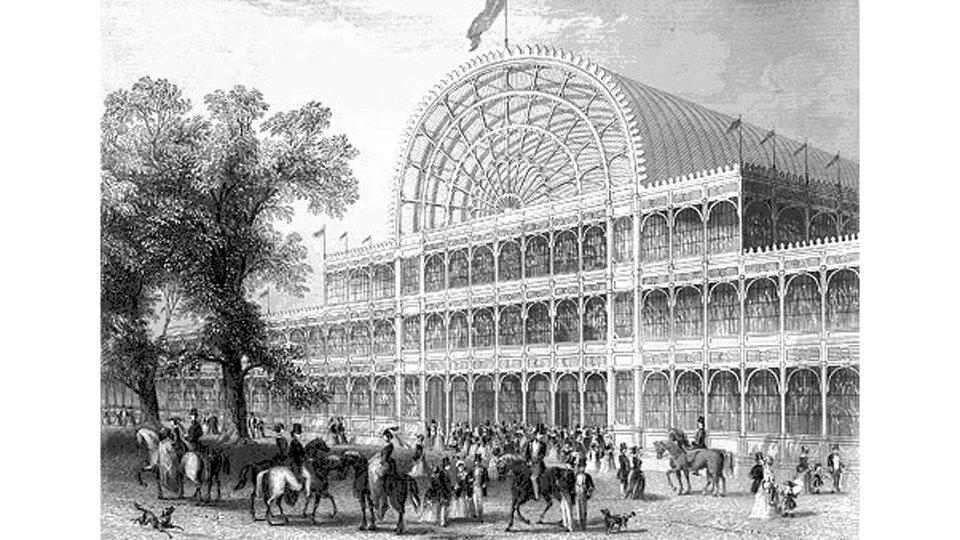
Arrival of the World Leaders in Berlin

Arrival of the World Leaders in Berlin
The arrival of the sovereigns in Berlin was a huge affair. The Russians had come first, followed by France, Holland, and then all the others. At the Hall of Glass, the nations set up their booths and stalls and put on display there most prized inventions and items.
The Republican Union, which was still riding high after Goodyear Treaty and the self-destruction of two of their Southron enemies, was intending to further impress the world with American "superiority." This time around they were sending a tag-team of Goodyear and and yet another Massachusetts man, Professor Samuel F. B. Morse of the Benedict Arnold University of Boston, as their representatives. Morse was a very well-known inventor, like Goodyear, who was also extreme in his anti-Catholic and anti-immigrant views and had worked closely with and supported Dr. Henry Marx, the Father of Phrenology. Morse and Marx had been working for Goodyear Enterprises since 1830, and they had been working on the lightbulb, telegram, and the railroad. When Goodyear had returned home after the World Congress of Vienna, he was met as if he was a Roman deity. They carried him through the streets of Boston on their shoulders and bestowed him the National Medallion of Service. The Union had high hopes for Goodyear and Morse in 1832.
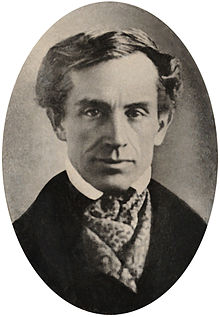
Samuel F. B. Morse

Charles Goodyear
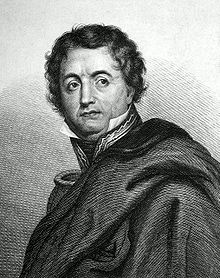
Prime Minister Soult
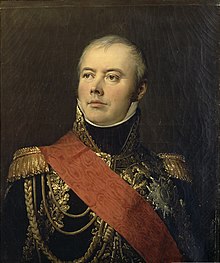
Spanish Prime Minister Jacques MacDonald
The following is a list of most (though not all) leaders and ambassadors present. Red lettering indicates countries not present or in existence at the time of the last World Congress. Vermont refused to send a representative after their Chancellor, Jay Thomas Powell, was ridiculed in 1826 at Vienna, though an official observer was present.
French and Spanish Empires:
- Napoleon I, Caesar of France, Emperor of India, King of Andorra, King of Italy, Lord of Mann and the Channel Isles, Mediator of the Helvetic Confederation, Protector of the Confederation of the Rhine, and Protector of the Free City of Lisbon.
- Napoleon II, Prince Imperial of France, Emperor of Spain, Duke of Reichstadt, Prince of Bombay
- Jean Soult, Prime Minister of France
- Jacques MacDonald, Prime Minister of Spain
- Franz I, Kaiser of Austria, King of Hungary, and King of Bohemia
- Prinz Klemens Wenzel von Metternich, Chancellor of Austria
- Ludwig I, King of Bavaria
- Baron Georg von Zentner
- Edward VII, King of England
- Hector Baldwin II, Prime Minister
- Frederick VI, King of Denmark-Norway and Sovereign of the Gold Coast
- Otto Joachim Moltke, Prime Minister of Denmark-Norway
- Maria Augusta I, Queen of Saxony, Grand Duchess of Warsaw, Grand Princess of Finland
- Wilhelm, King of Württemberg
- Karl, Grand Duke of Baden
- Stéphanie, Consort, Daughter of Napoleon I of France
- Louis I, King of the Portuguese Confederation (Powerless; ordered directly by Napoleon I of France)
- Elisa Napoleona, Princess of Lucca and Piombino, daughter of Caesar Napoleon I's sister Elisa
- Zénaïde I, Queen of the Two Sicilies, Daughter of Joseph Bonaparte (Joseph I of Ireland)
- Joseph I, King of Ireland
- Dominic I, Prince of Ireland
- Louis I, King of Holland, Brother of Napoleon I of France
- Oscar I, King of Sweden, Godson of Napoleon I of France
- Resid Mehmed Pasha, Ottoman Grand Vizier
- Nicholas I, Czar and Autocrat of all the Russias
- Johann Josef I, Prince of Liechtenstein
- Charles Goodyear, Representative
- Samuel F. B. Morse, Representative
- Thomas Bragg, President (Bragg's son Braxton, now 15, accompanied him)
- Urbano Pepito Ale Rivera, Chief Minister of Peru
- John Winslow, Official Observer
- Tancredo Heraclio Solos, General of Chihuahua
- Modesto Chucho Ramos, Chief of Staff of Emperor Agustín Cosme I
- General Rumford Pickens (also representing the Chesapeake Republic of Maryland)
- John Hardee, Representative (also representing the Republic of Jamaica)
- Teobaldo Martín Pavia, Representative
- Diego Martinez, Representative, Speaker of the Texan House
- Friedrich Wilhelm III, King of Prussia and Hanover
- Count von Wylich, Chief Minister
The King of Prussia was immediate in his proposal of marriage and dynastic union to Maria Augusta of Saxony. She probably knew it was pure politics, but since she was at the end of her line, she likely thought it better that her new stepson Friedrich Wilhelm IV inherit a stable Saxony, Warsaw, and Finland than plunge her realms into a succession crisis for want of a Wettin. Maria Augusta was in poor health when the ceremony occurred on July 1st, 1832, in front of the entire Congress. Napoleon I of France saw through it immediately as a power ploy, and almost admired Friedrich Wilhelm III's doggedness on making Prussia great, even to the point of marrying an old hag. Napoleon was determined to not be outdone in Berlin, and he had a few tricks up his sleeve yet to play.
Many of the countries at the Congress were very unhappy about Prussia's power-grab. Maria's countries were still hers, but the moment she would drop dead, everyone knew the Hohenzollerns would snatch them up. However, the protests against the Hohenzollern-Wettin unification dulled when the Republican Unio unveiled the world's first functioning light bulbs. It was a spectacle for the ages as all the representatives entered a very dim palace ballroom, only to have the entire place light up in a flick of a switch.
Some were scared to death, and immediately left. Their fear was justified, though no one knew it; the bulbs were still horrendously unstable and could have easily torched the entire group of world leaders in an instant. Fate alone prevented a tragedy. After Morse flicked the switch, Charles Goodyear spread his arms out to his sides, did a slow spin, and famously stated, "Welcome, one and all, to the Era of Electricity."
Prussian scientist Ludwig Klink was by far the most electrically-knowledgeable men present besides the Yankees. He took the Union men aside and asked them a long series of questions, forever instilling in him a love of the light bulb. Klink would go back with one bulb, a gift, and would become obsessed with trying to make it last longer than just a couple minutes.
The next event, however, was much less welcomed to the Republican Union representatives. The Eisenbahn Prinz Wilhelm was recognized by Goodyear instantly as his own design from the long-lost pages of his sketchbook. As the train, loaded with civilian passengers, chugged off to Potsdam, the Prussian anthem blaring all along the tracks, Goodyear went off, racing down the side of the rails on foot, screaming at Friedrich-Wilhelm with berserk rage. He went on and on about how the Prussian king had stolen one of the most monumental designs in history from him. Friedrich-Wilhelm's only reply was, "I did not. But even if I did, there is no way it could ever be proven."
World history started on a radically different course with those words. Goodyear declared he would develop his own train, and that it would be the best train in the world. He announced he was forming his own company with Morse. Goodyear Rail then became the first private train company in the world (Prussia's was a state project). He also claimed that from then on out, America would outdo every other country's technology. His words would prove prophetic.
THE WORLD CONGRESS OF BERLIN: STRATEGIZING

"Politics are a necessity; this is true. Politics are unavoidable; this is also true. But I wish politics would go to Hell and leave me alone. This is the greatest truth."
-Napoleon I to Napoleon II, July 5th, 1832
Those words were uttered behind closed doors after Goodyear's rampage hours before. The French Imperial extended family was staying in the Schloss Steinadler, a new palatial complex built explicitly for the Congress. Napoleon I, Napoleon II, Soult, and MacDonald drew up their strategy for the upcoming politicking.
"Politics are a necessity; this is true. Politics are unavoidable; this is also true. But I wish politics would go to Hell and leave me alone. This is the greatest truth."
-Napoleon I to Napoleon II, July 5th, 1832
Their strategy was as follows:
- Prevent Russia from drifting into the Prussian Camp
- Reaffirm French sovereignty over Canada and the South American holdings
- Discuss England's current situation
- Establish new trade routes with the expanding Dutch Malaysian regions and assist in the crushing of piracy, which had become a blight on the high seas once again since the collapse of the British Royal Navy and the East India Company
- Bring up the topic of the Orient for the first time in detail
- Push for rights to new African colonies
With the North American colonies, France was determined to make sure the Republican Union kept its paws off any more of Canada and Louisiana. Caesar had also been growing suspicious of rumors about how the R.U. had considered invading the Green Mountain Republic of Vermont, which was an immensely useful buffer state. The possibility of a preemptive strike and invasion by France was on the table if Vermont didn't accept a future offer of military support and monitoring. Also, American "cowboys" had been continuing to seep across the border into Louisiana, bringing with them their guns and fanatical religion.
With the South American colonies, France was becoming wary of the growing alliance between the Republic of Gran Colombia and the massive Republic of Peru. Brazil and Argentina were stable, but if a conflict ever occurred on the other continents, Colombia and Peru might act and seize large chunks of the two colonies. To remedy this, Napoleon II suggested playing the South Americans off of Mexico, a hated usurper to all its neighbors.
In the Kingdom of England, resentment boiled. Edward was a moderately successful but immensely unpopular leader and, though had managed to salvage what was left of the economy, having French troops in Cornwall, Scotland, and Mann, as well as in the Welsh dictatorship, on formerly sovereign soil made many English discontent. Violently discontent. Riots had broken out from London all the way up to Scotland. Edward was fearing for his life, and refused to leave the palace for fear of assassination. If terrorized enough for his own well-being, chances were high he would let France do anything it wanted to keep him in power. If it took having members of the French Old Guard patrolling Buckingham Palace, Edward would do it.
Edward's daughter was also growing into a pretty young woman of great intelligence. She was almost 14, the age when many European royals were prepared for marriage, and she showed no signs of hereditary mental illness or gibbering insanity. Napoleon I had considered her likely to marry a duke of some sort and live quietly, but he was thoroughly discouraged by her apparent interest in young Alexander II of Russia. If they were married, their child would be one quarter Prussian, two quarters Russian, and one quarter English, which spelled nothing but the true meaning of the word "holy terror" to the Bonapartes. The very idea that a Russian Czar might, in the future, hold claim to the English throne, was a nightmare for France.
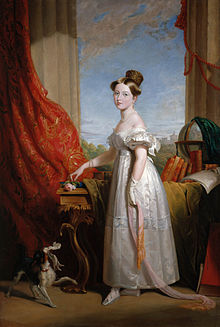
Princess Victoria of England

Alexander II of Russia
Louis, King of Holland and Napoleon I's brother, had attained exclusive rights to the Malay Archipelago during the World Congress of Vienna. In the years since, it had proved a very profitable prize indeed. The islands had a growing Christian population, and the money from all the spices, herbs, and animals was making tiny Holland a force to be reckoned with. Clearly, more trade routes with France would be mutually profitable. The Java War had also just been completed, bringing the native warlords to heel once and for all. Following the collapse of Spain, the Dutch had seized the Philippines, and were now engaging in a lengthy guerrilla war against the native Filipinos and the last remnants of the Spanish Army.
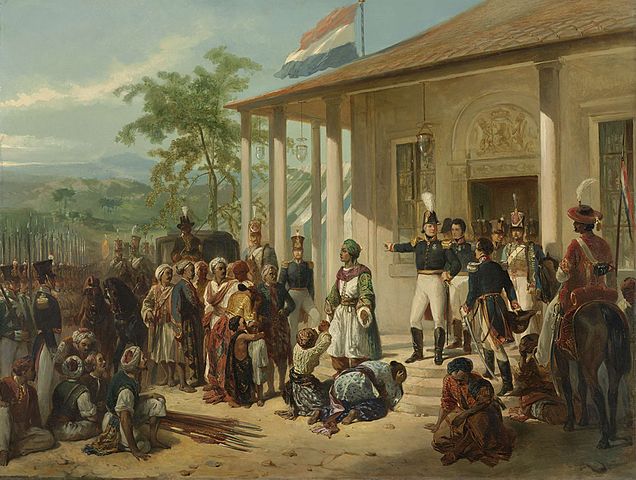
Native warlords surrender to the Dutch colonial government in Java (1830)
The Orient had been a mysterious place for centuries. Past the Himalayas and the Hindukush was the massive Chinese Qing Empire, a hugely outdated backwater of almost half a billion people. Further to the north-east was Japan. Napoleon's personal explorers had reported back claiming that Japan was "far too complex, entrenched and stable to ever be toppled or colonized." They said that there was little to be gained by trying to open them up. The only fruits of the voyages to Japan were the "katana" swords brought back, which were put on display in the Hall of Glass and one that hung from Napoleon II's hip. China, meanwhile, was considered ripe for the taking. Trade between the Qings and Europeans had been going on since 1793, but the current Emperor, Tao-Kuang, was struggling miserably with the onslaught of opium coming into the country. The Chinese army was a relic of the Renaissance, and the South-East Asian Chinese vassal states were starting to fall under influence from the encroaching Dutch, French, and Austrians. It was an interesting set of circumstances to Napoleon I.
Finally, the newly-announced Prussian expansion in Africa was a huge blow against France. The more colonies owned by rival countries there were, the more non-French items there were on the international market, jeopardizing Napoleon's dream of world-wide monopoly. Prussia had made it known they had little desire for anything north of the Sahara Desert. Thus, Napoleon II suggested a Spanish invasion of North Africa, through Morocco. Then, Spain would just claim everything down to the South Sahara that wasn't already claimed. This move had the potential to anger the Ottoman Empire, but the Bonapartes considered it worth the risk and the Ottoman Empire to not be taken very seriously anymore.
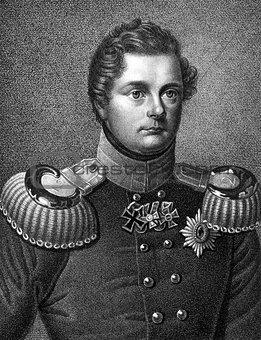
Friedrich-Wilhelm IV of Prussia and Hanover
As the Congress officially convened to discuss business, Friedrich-Wilhelm III brought the Crown Prince to take over most matters. The prince was 37 years old and hardly handsome, but he knew how to get things done and he was determined to poke his counterpart Napoleon II to test the waters of the future. The Prussian prince had already met with Czar Nicholas, offering an alliance at a meeting in Nicholas' hotel. Nicholas was luke-warm to the idea. For one thing, he did not know Friedrich-Wilhelm II enough to know if he was a competent future ally. Though the Crown Prince was 37, he was but a boy during the Great Wars of the Empire, and had been fairly removed from politics since, concentrating on a military career. When the Prince sauntered out and began brutally laying down the law to the Bonapartes, Nicholas's ears perked up. Everything was a fight from July 6th onward.
Concerning the Americas, July 6-8, 1832:
The Republican Union representatives, still absolutely boiling with rage over the Eisenbahn Affair, were now under fire themselves, with France complaining of continued encroachment by Union cowboys and settlers on their lands. The town of Praise in the Dakota region, for instance, was called a plot by the Union government to achieve Manifest Destiny by stealing land from France right out from under them. Goodyear flew into another rage, accusing the French of harassment of innocent American settlers who, without any government endorsement on the Union's behalf, went out west to explore and make a living in land France wasn't even really using anyway. France argued back that ongoing rumors had it that the Union was in the midst of a build-up to invade the Green Mountain Republic of Vermont. Goodyear was enraged, barking insults back at the French. He left the building for some minutes, then returned with a look of total calm on his face. Once more, he denied any build-up on the Vermont border. Little did anyone know he had just signaled a Union officer outside to send word to Philadelphia to annex Vermont. That done, Goodyear ceased to argue the matter and sat there "with that frightening grin on his face."
One positive aspect of this discussion was the Alyaska Treaty of 1832, which marked the end of Russian expansion into North America at the Columbia River up to the 50th parallel. This resolved and pressures that were felt by France and the North American powers that Russia would attempt to claim the entire Pacific seaboard north of Mexican California. The Czar stated that Russia had an endless frontier and not enough people to settle all of it. France in turn gave thirty million francs to Russia to reward them for their peaceful attitude in the matter.
When the time came to discuss South and Central America, Napoleon II rose to speak. He immediately cited abuses of the Peruvians and Colombians at the hands of the Mexicans, and brought up the possibility of alliance. The Mexican representatives, seeing full well what was happening, immediately left in rage. After some hours of discussion, the South American nations formerly allied with Mexico during the Fall of Spain agreed to remain neutral internationally, but would cease trading with Iturbide immediately.
Lastly, in the American discussions, Virginia announced it would be separating its nation into four more-easily manageable provinces. West Carolina, of course, was known now as the Province of Boone, then there was the Province of Kentucky, the Province of Westsylvania (formerly sometimes referred to as West Virginia), and Virginia proper became the Province of Columbiana. Potentate Zachary Taylor had drawn these up originally as zones of control for his martial law, but realized breaking the country up into provinces made everything else easier as well. Virginia's General Pickens, its representative at the Congress, also lambasted the Union and the AFC Church for sending down missionaries to the South to preach AFC and abolition to the slaves. France and Spain were currently the only major countries where slavery was still technically legal, and thus Virginia just looked backwater for claiming such a thing to most people present.
Concerning England, July 8-10, 1832:
England was a whole other can of worms. A can of worms full of holes and rusting out the bottom. Immediately upon hearing of the possibility of French troops stationed in London, many other national leaders called it an invasion. In particular, Prussia and Denmark-Norway thought it yet more French tyranny. They were shocked when the bald, fat Edward VII rose from his seat and backed up the Bonapartes. After days of intense quarrels and arguments, Napoleon decided to do what he wanted and announced French troops would be sent in to support and protect the English royals. From that point on, France's rivals were secretly supporting the idea of a Second English Civil War to depose "Edward the Puppet."
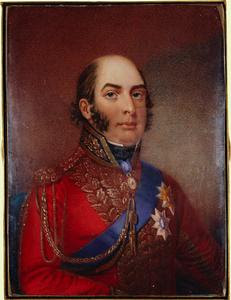
Edward VII, "The Puppet"
Concerning Malaysia, Indochina, and China, July 12-September 20, 1832:
Holland immediately accepted France's offer of new trade routes, and several other countries also got in on the deal, providing a good boost to Europe's economy. Afterward, France and most of the nations present approved of a future Dutch invasion of Indochina to take it from the Qing vassals. All of Europe was growing tired of paying China's high prices, and a unified effort was agreed to be made to take down the Qing Dynasty and replace it with a pro-Western colonized government. It was guaranteed by the major powers that no one would attempt to force their own crowns over the Chinese, like the French had done in South America.
Concerning Africa, September 20-October 8, 1832:
After the Asian topic, the Congress dragged on. Hundreds of small affairs were settled and discussed. Over all the noise, though, was the looming titanic battle for Africa. Prussia made the first move, finalizing their plans and making them official. France and Spain countered, claiming the Sahara and much of the north-western coast. Friedrich-Wilhelm IV was not surprised by this and tried to get Sweden, Russia, and Austria to assist him. Russia spoke up now and then, but the others did not. In the end, a stalemate was reached, but many agreed that for the first time, France had not gotten what it wanted. It's borders in its African claims were mostly deserts and useless land. Prussia had gotten the jungles and farmlands. However, everything was still on paper only, and the actual colonization wouldn't start up for real until several years down the road.
Surprise Announcement, October 20, 1832:
The Bonapartes were glowering over their defeat in the Africa Matters, and were longing to make it up somehow. Napoleon I pulled out a wild card and announced that not only would his son be Caesar of the French and Emperor of the Spanish, but also Emperor of Brazil and Rio de la Plata. The effect of this, as it was, was not much physically. All it basically was was a change in name from colony to empire. However, it meant that upon Napoleon I's death, Napoleon II would be emperor of four empires (if he indeed inherited the Austrian crown). Napoleon II was getting set up with a massive superiority complex and an insanely complex and bloated logistical nightmare of a government, and everyone knew it.The economic effect of the Congress on Prussia was huge. Thousands had converged on the nation to see and attend the event, making up well over the amount of the cost of hosting. As the clean-up commenced as the representatives went home, bankers, builders, carpenters, blacksmiths, and especially prostitutes started to count their fat profits with glee. The Prussian King was pleased with the latest events.
After those events, the world powers agreed that the next World Congress would be held in Paris, in 1838. Many were suspicious that Caesar thought he himself would be dead by then and it would help shine a spotlight on his successor and keep the world's fear of the Bonaparte family solidly in place. Also agreed upon for 1838 was that the Rheinbund (Confederation of the Rhine) would be represented for the first time (the French had done this in 1826 and 1832). This would later be a big event in European politics.
Months later, in 1833, debate swirled on if the Congresses really accomplished much. At the end of the Congress of Vienna, the Dissolution of Spain occurred. During the final the weeks of the Congress of Berlin, the Republican Union was already working against Vermont, and soon actually invaded after the Congress ended. Both times, war immediately followed a Congress. The world would worry just what might happen in 1838...
Last edited:
Oh boy. Vermont, we hardly knew ye....
Are the French going to be more angry over Vermont than classic? Or are they still going to write em off?
Are the French going to be more angry over Vermont than classic? Or are they still going to write em off?
Yeah i remember this from the original.World history started on a radically different course with those words. Goodyear declared he would develop his own train, and that it would be the best train in the world. He announced he was forming his own company with Morse. Goodyear Rail then became the first private train company in the world (Prussia's was a state project). He also claimed that from then on out, America would outdo every other country's technology. His words would prove prophetic.
Threadmarks
View all 142 threadmarks
Reader mode
Reader mode
Recent threadmarks
THE 2019 MADNESSVERSE HOLIDAY SPECIAL: "IT'S PATRIOT-SAINTS DAY, ZAP ZEPHYR!" THE BIGGEST HOSTAGE OF ALL "THE WHOLE WORLD HEARS YOU!" OSWALD: AUTHOR OF HIS OWN DESTINY THE GREAT EUROPEAN SCHISM: RISE OF THE NEW HOLY ROMAN EMPIRE IN A "SAFE" PLACE THE SUMMER OF '37: THE OLD HOMESTEAD ROUNDERS: THE WORLD SPORT
Share: